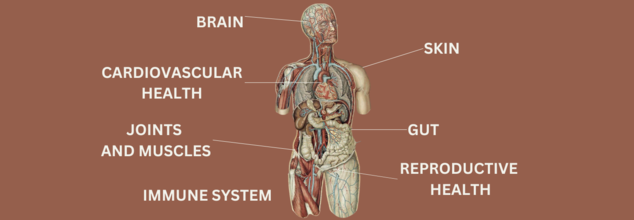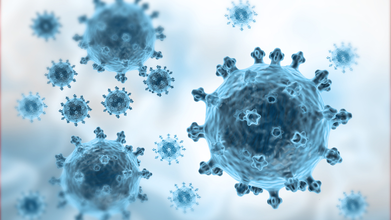- Health Conditions A-Z
- Health & Wellness
- Nutrition
- Fitness
- Health News
- Ayurveda
- Videos
- Medicine A-Z
- Parenting
Stress Is Affecting Different Parts Of Your Body, Know How

Although stress is a normal component of life, prolonged stress can have negative health repercussions. The infographic shows how extended stress impacts the body's systems, including the mental and physical health systems.
Let's examine the main ways that stress appears in each area of the body:
Mental and Brain Health
The brain is significantly impacted by stress. Cognitive function is among the first areas impacted, resulting in problems focussing and mental fog. High amounts of stress can also lead to mood fluctuations, anger, sadness, and anxiety. These symptoms have the potential to worsen over time and impact general mental health and wellbeing. This is a result of the brain's ongoing effort to adjust to stimuli, which strains its capacity for efficient operation.
Heart and Circulatory System
Stress has a particularly strong effect on the cardiovascular system. Extended periods of stress have been linked to elevated blood pressure, elevated cholesterol, and an increased risk of stroke or heart attack. Stress causes the body to release adrenaline and cortisol, two hormones that narrow blood vessels and increase heart rate. This can put stress on the heart over time and raise the possibility of major cardiovascular problems.
Skin-Related
Stress can also be shown in your skin. Physical symptoms include dull or dry skin, brittle nails, and hair loss. The body's capacity to recover itself can be slowed down by stress, which prolongs the healing process. Furthermore, because stress causes the body to generate more oil in reaction to hormonal fluctuations, disorders like acne can exacerbate under stress.
Stomach
Stress has a profound effect on the digestive system. It is the root cause of many digestive problems, including indigestion, constipation, diarrhoea and bloating. Malnutrition and other health issues may arise from a decline in the gut's capacity to absorb nutrients. Stress can worsen illnesses like irritable bowel syndrome (IBS) and cause more pain and discomfort in addition to these symptoms.
Muscles and Joints
One of the most obvious bodily indicators of stress is tense muscles. Inflammation and pain are frequently the results of this strain, especially in the back, shoulders, and neck. Stress-related muscle tension can eventually lead to decreased flexibility, an increased risk of injury, and chronic pain issues.
Immune System
Because stress impairs immunity, the body is more vulnerable to diseases and infections. It shortens the duration of healing and lessens the potency of immunological responses. This is because long-term stress inhibits the immune system's ability to produce cells that aid the body in warding off infections. Furthermore, the body's capacity for self-healing is hampered, which delays the healing process following an illness or injury.
Reproductive System
Stress can have a direct effect on reproductive health in both men and women. Stress can worsen premenstrual syndrome (PMS) symptoms in women and lead to irregular menstrual cycles. It also has an impact on hormone production, which may cause libido to decline. Stress can impact sperm production, testosterone levels, and sexual function in males.
This Mysterious New Virus Could Spread Faster Than Covid-19 And Flu

Credits: iStock
A new virus is going around the world, and experts say that it is stronger than COVID and flu. This has been termed as the new 'untreatable' mystery virus, and some even have warned that disinfectant cannot get rid of it.
This is the adenovirus, which exhibits same symptoms as a serious flu, including shortness of breath, a runny nose, and a sore throat. However, one difference is that this virus has lack of treatments. So for anyone who may have caught it, will have no other option but to "tough it out". However, the silver lining here is that in most cases, adenovirus is fairly mild, but if you are immunocompromised, then the symptoms could become more serious, reports the Mirror.
Eric Sachinwalla, Jefferson Health's medical director said that this virus is still unfamiliar and thus not much can actually be done to treat adenovirus. Speaking to PhillyMad, he said, "It is pretty contagious because it is heartier than other viruses - soap and water, or everyday disinfectant, won't kill it, so it tends to live in the environment longer."
Common Symptoms Of Adenovirus
- Shortness of breath
- Runny nose
- Sore Throat
- Diarrhea
- Pink eye
The good news is that for most part, these symptoms are manageable with rest. However, people who are more vulnerable, like the elderly, pregnant, or immunocompromised, may have to be more careful and keep a closer eye on their symptoms.
If the fever takes the body temperature to 40 Celsius, then it could be a serious situation, and you must consult your GP.
Read: Mystery Disease Adenovirus: New Virus Said To Be Stronger Than Covid And Flu — All You Need To Know
How Long Do The Symptoms Of This Mysterious Disease Last?
The symptoms usually start to subside within two days, however, if the symptoms stay even after three days without any relief, it might be a red flag. The best thing to do during such a situation is to go consult your GP.
What Is Adenovirus?
Adenovirus is a virus that has more than 60 different strains, which is why it is able to cause a variety of symptoms. Adenovirus refers to a group of common viruses that usually trigger cold- or flu-like illness. It spreads easily because it is far more resilient than many other viruses. Ordinary soap, water, and standard disinfectants do not reliably destroy it, allowing it to persist in the environment. As a result, infections often cluster in places where people spend time close together, such as daycares and military barracks. The virus spreads through the respiratory tract, can be shed in stool, and can survive for some time on contaminated surfaces, according to the CDC.
The reason for its spread right now is due to the surge of flu cases in the southern hemisphere which has influenced the outbreaks in the northern hemisphere. Another reason is the lower flu vaccinate rates, which has now made a large number of population more vulnerable to infections, overall, including adenovirus.
How Can You Stay Safe?
Since adenovirus spreads through close contact and is resistant to many everyday disinfectants, hygiene remains the key. The best way to stay safe is by avoiding close contact, especially with those who are unwell. You may also keep an eye on your symptoms, including your body temperature and take steps to prevent the virus from spreading by taking precautions, as well as getting the flu jab.
These 5 Trends Could Shape Healthcare In 2026

Credits: iStock
As we step closer to 2026, let us look at what healthcare trends could shape the upcoming year. The 2026 healthcare trend will follow or shape on challenges that 2025 threw on us, these included a surge in lifestyle diseases, continuous cases of non communicable diseases, which are preventable, and a rise in infectious diseases. Based on them, the predictions of 2026 healthcare trends can be made.
Preventive Care Will Matter The Most
In 2026, healthcare will look most at prevention. As a significant portion of diseases, like the NCDs or the non communicable diseases, which also include half of all the cancers are preventable. This includes changes in lifestyle habits, including food habits, dietary fiber intake, exercise, and maintaining a regular sleep cycle.
Careful Use Of GLP-1 Medication
2025 saw a surge in the use of GLP-1 medication, however, this year also saw many reported unusual side effects of the medication. The year 2026 will emphasize more on the correct use of the medication, as well as, what areas must one pay heed to, especially after the medications have been stopped.
Also Read: These Are The 7 Common Mistakes People Make After Stopping Their Weight Loss Jabs
Shift In Patient Coverage
In the US, new changes have been done in Medicaid and its eligibility, which might change the rules on potential expiration of advanced premium tax credits. This may mean that many patients could become uninsured, or underinsured. Moreover, other changes in the coverage may include GLP-1 medication, as on November 6 of 2025, President Trump announced deals with Eli Lilly and Novo Nordisk slashed prices and brought coverage to eligible beneficiaries for just a $50 copay, down from $1,000 per month, out of the pocket.
DIY Skincare
Experts, like board-certified plastic surgeon John Diaz, MD, tells Cosmopolitan that 2026 will see a rise in DIY skincare trends. This would be making skincare products yourself, which could include yogurt face masks, to kitchen-sink sunscreen. However experts have pointed out that products which are not backed by science or have used ingredients without a correct measure could do more harm than good to the skin. “Many people who tried DIY skincare found these treatments to be inconsistent or ineffective. At the end of the day, consumers want efficacy, which drives them towards products formulated with scientifically proven ingredients," says the doctor.
Annual Testing To Become A Norm
In 2025, there were many cases of young people experiencing strokes and hear attacks. This has shifted the conversation on annual testing, regular screenings, and blood works for people who may fit the traditional definition of "healthy". Many people under the age of 40 have also reported cancer, which is what makes early screenings, annual testing, and blood work more important to ensure that everything in the body is working smoothly.
While getting checked once a year is not a new concept, however, it was mostly common in older adults, but now more young adults are also now considering getting annual tests done, as they are easily available and can help detect severe illness early.
You May Like To Read: Did Scientists Just Come Up With A New Blood Test That Detects And Monitors Lung Cancers In Real Time?
Adenovirus: Highly Contagious Mystery Illness Spreading Fast, Watch Out for These 12 Symptoms

Credits: Canva
The so-called “mystery virus” behind lingering sore throats, blocked noses filled with mucus, and days of exhaustion is actually well known to doctors. According to Eric Sachinwalla, medical director of infection prevention and control at Jefferson Health, the culprit is adenovirus.
What makes this virus particularly difficult to control is how tough it is. Adenovirus can survive soap and water, withstand many everyday disinfectants, and linger on contaminated surfaces for long stretches of time. Below is what experts know so far about this fast-spreading infection.
What Is Adenovirus?
Adenovirus refers to a group of common viruses that usually trigger cold- or flu-like illness. It spreads easily because it is far more resilient than many other viruses. Ordinary soap, water, and standard disinfectants do not reliably destroy it, allowing it to persist in the environment. As a result, infections often cluster in places where people spend time close together, such as daycares and military barracks. The virus spreads through the respiratory tract, can be shed in stool, and can survive for some time on contaminated surfaces, according to the CDC.
Adenovirus: What Are The Symptoms Of Adenovirus?
“Adenovirus is a typical virus that causes common cold or flu-like symptoms,” says Dr Deborah Lee at Dr Fox Online Pharmacy. That does not mean adenovirus is the same as a cold. Instead, adenovirus is one of many germs that can cause cold-like illness. A simple way to think about it is that a “cold” describes the symptoms, while adenovirus is one specific virus that can lead to them.
Symptoms can vary depending on the subtype involved. While there are more than 100 known subtypes, only 49 infect humans. Dr Lee notes that people may experience any of the following:
- Fever
- Runny nose
- Sore throat
- Swollen cervical lymph nodes in the neck
- Cough
- Shortness of breath
- Conjunctivitis
- Ear pain
- Diarrhoea
- Vomiting
- Stomach pain
- Urinary tract infection
Adenovirus? Is It Contagious?
“Adenovirus infection is highly contagious,” Dr Lee explains. “It spreads by breathing in infected droplets, by touching the virus and then rubbing the eyes, or through the faecal-oral route, often due to poor hand hygiene after using the toilet.”
She adds that the virus spreads quickly in crowded settings where people are in close contact. To eliminate adenovirus from surfaces, Dr Lee recommends stronger cleaning agents such as bleach-based solutions or hydrogen peroxide. “The virus is resistant to soap and many commonly used cleaners,” she says.
To reduce the risk of catching adenovirus or other respiratory infections currently circulating, Dr Lee advises staying away from people who are unwell. She also suggests the following precautions:
- Avoid touching your face and nose
- Use a clean tissue to blow your nose and dispose of it immediately
- Wash your hands often with soap and warm water, then dry them thoroughly, especially after using the toilet or changing nappies
- Clean children’s toys regularly
- Disinfect worktops, changing areas, toilets, and bathrooms
- Avoid sharing cups, plates, food, or towels
- Wear a mask if you need to go out while unwell
- Keep windows open and ensure rooms and workspaces are well ventilated.
© 2024 Bennett, Coleman & Company Limited

